#why buffy matters
Text

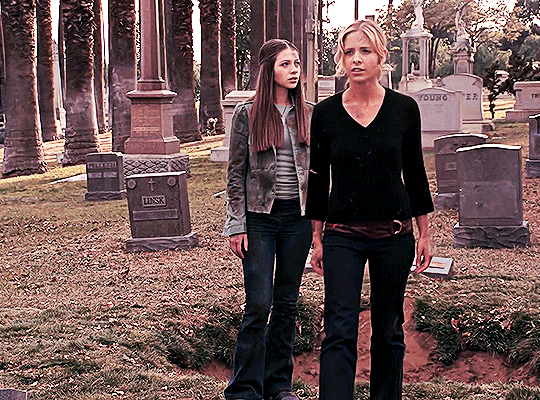
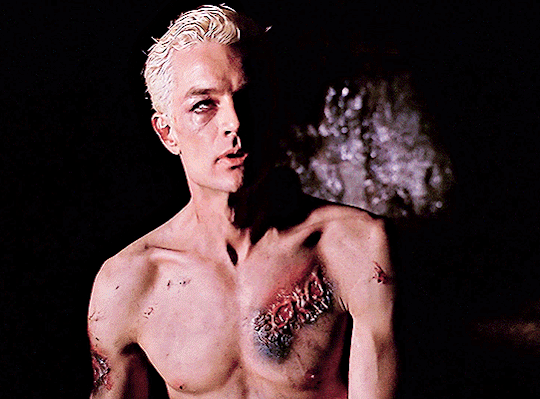

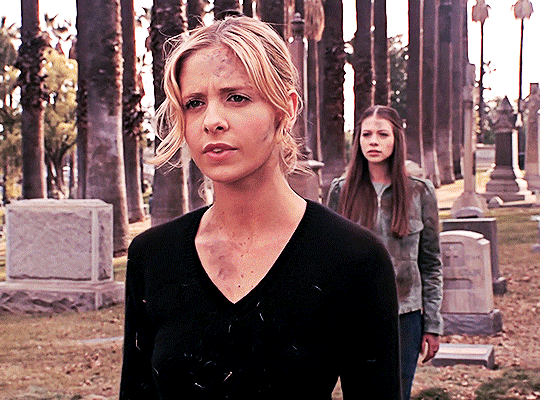

BUFFY THE VAMPIRE SLAYER || 6x22: Grave
The sixth is the only example of closing a season with the image of another character. While the choice allowed the season to close with what would have been a surprising moment for many viewers, it also indicates the significance of this character in particular and the motif of the spiritual journey in general.
- Rhonda Wilcox ; Why Buffy Matters, The Art of Buffy the Vampire Slayer
#spuffy#spike#buffy#btvsedit#spuffyedit#spuffygifs#dailybuffysummers#spikeedit#buffy the vampire slayer#*#parallels#meta#s6#6x22#why buffy matters#rhonda wilcox
628 notes
·
View notes
Text
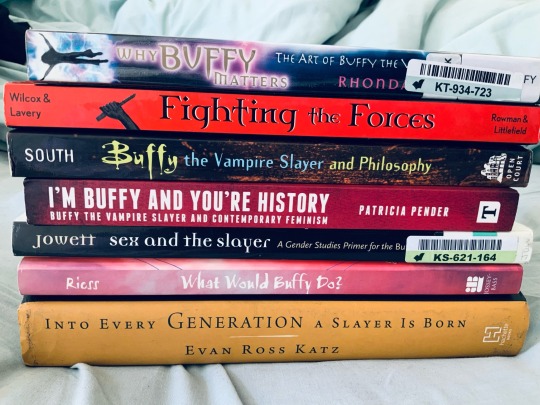
I'm a normal person.
#buffy the vampire slayer#buffy#why buffy matters#fighting the forces#buffy the vampire slayer and philosophy#I'm buffy and you're history#sex and the slayer#what would buffy do#in every generation a slayer is born
9 notes
·
View notes
Text
Buffy the Vampire Slayer takes place in a world full of demons and magic and werewolves and invisible girls and convincingly human-like robots; in a world where the Russian Revolution took place in 1905 and a song released in 1957 could be a hit in 1955 and high school sports coaches can use declassified Soviet research to turn teenagers into fish monsters; in a world where vampire attacks are commonplace enough that the police have a standard lie ready to deploy about them and where weekly student deaths are not reason enough to shut down the local high school.
But so far, forty-one episodes into my rewatch, the most fantastic and least plausible thing in the show by some distance is the fact that Buffy still willingly chooses to socialize with Xander Harris.
#btvs#yes it's very boring and obvious to say that Xander sucks and is a terrible friend who is weirdly obsessed about Buffy's sex life#but unfortunately that's the version of the character that the writers consistently put in the show#I genuinely cannot fathom why Buffy lets him talk to her the way he so routinely does#(or what Cordelia is supposed to see in him for that matter)#at this point I am just desperately clinging to the thought that Xander will start to become more tolerable soon
110 notes
·
View notes
Text
love how pathetic and fucked up and sad faith is but i also do love how cutesy she is about it for like no reason. lounging on her bed kicking her feet. stabbing the air with her fork and doing a little shoulder shimmy at dinner w buffy and joyce. eating cookies with milk. drawing a silly heart on the window w a stake through it. putting an angry face on her makeshift punching bag made out of like towels and duct tape. all this while being 5’6” and having dimples. like woagagahsghsg…. just a little thing….
#sorry feeding her spoonfulls of soup#smacking her on the back of the head for being an idiot#born in a wet cardboard box all alone etc etc#this is her like inherent buffyism i think. the cutesyness that prevails.#buffys inherent faithism is like the freakness that prevails no matter what. okay#sry just saw a gif of her at dinner w buffy and joyce why is she like that.. so sweeties
223 notes
·
View notes
Text
*sighs in post mildly broke containment again* there's nothing wrong with reading willow as a lesbian, this is a piece of fiction, and the post I made took on a jokey tone for a reason and is ultimately more about underlying bi-erasure on tv than anything else kaybye ✌
#im watching btvs#jeepers creepers but btvs is bringing out the *taking it all very seriously in a very morally high-and-mighty kind of way* crowd#and i dont mean about shit that matters such as discussing racism or misogyny in fandom#just about whether you agree or dislike someone's read of a situation - move on my friend if you dont agree#i mean i could go on a rant about HOW the show portrayed willow-the-now-lesbian#(and while im at it why i hc buffy-the-apparent-heterosexual as bi too but nobody has disputed that part oddly enough)#but that would be an effort im truly not interested in expending on this day and possibly never and has been written before#im mostly just live-blogging and moving on#if im writing anything fanfic-wise it'll be about kendra and that'll be my full fandom contribution#ok but the ONE thing i'll mention is the fight willow has with tara which is one of the rare Ls for tara#where she basically admits that she's afraid this is a phase because willow has loved men/been with oz#and that's just an interesting fight from a meta perspective because the idea that bi women have to *choose a side*#and are consistently questioned and doubted by their lesbian partners#is a core element of biphobia within a gay relationship that many people can attest to#hell it's a big part of bisexual rep that is conscious of itself that at some point there's a plotline where the person is questioned#about their true loyalties and asked to take a side#btvs ofc is NOT conscious of this underlying tension and in fact i would argue is agreeing with tara that this is what needs to happen#for several other reasons as well#but literally people have WRITTEN about this im not saying anything bold and controversial here AND it doesnt take away#from lesbian willow reads to acknowledge the flawed approach of the show to her sexuality like come on#willow rosenberg
23 notes
·
View notes
Text
Yeah so anyway, it's been 20 years after the fact, so really nobody can stop me from seeing Spike as a character who ended up in a shitty abusive cult/family and spent years and years being groomed and exploited by the fact that at his core he’s just a somewhat impressionable person who tends to try and make himself what he thinks the people he cares about want him to be and his arc especially in season 5 is about how the further he gets away from that the more he starts to realize “yeah actually that’s messed up” and starts trying to unlearn all the crap he was taught and it’s hard and he flounders sometimes and falls back on old behaviors but he’s trying really hard and that counts for something right? Like it just means a lot to me to think of him as a character who was pulled into the darkness because he didn’t really know any better/know what he was getting into (and he never quite fit into the darkness in a way that was expected of him) but eventually he starts to have a little bit of an awakening and decides to claw his way out and it’s messy and bloody and painful but he gets there eventually.
#and that’s why I think he deserves to be angry at Angel#but yeah anyway#and the great thing is I can think of him that way because it doesn’t really matter what I think#because it’s long over and I’m just a rando on tumblr#buffy the vampire slayer#btvs meta#spike
234 notes
·
View notes
Text
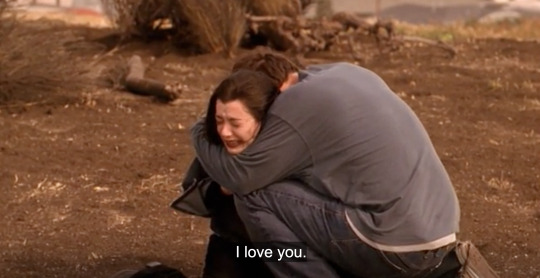
crying again ... love is stored in the buffy the vampire slayer show
#i haven't been able to watch in over a week... immediately tears#got so preoccupied i almost forgot that what matters most in life is btvs#buffy watch#sorry idk why this posted twice
9 notes
·
View notes
Text
youtube
That is precisely why Buffy still matters. And maybe more so now than it ever did. Timeless television has a way of keeping you coming back to it not because of what it contains that matters. But rather what you can get out of it because of what matters to you. In actual fact it doesn’t contain it. It’s created in the moment. And timeless art/entertainment of all kinds is like this. There’s never really a one specific fundamental lesson to take from it because it always depends on the observer what can be learned. So it stands the test of time as meaningful material because there’s always an observer creating that material for it. Truth be told - Buffy probably isn’t meant to be that deep. It’s likely not intentional how deep it is when it comes to its meaning. But it is that deep because the people that watch it add more and more to it’s depth all the time.
So it’s not the content that is why it still matters.
It’s the content creators for it. Just like you.
You make it still matter.
3 notes
·
View notes
Text
If my college aged friends were lecturing me on taking care of my little sister I would be fucking violent. All of them with their only childness have no right to say anything about Dawn like shut the fuck up plus she has the added stress of Dawn not even being real
#rehks rants#btvs real me#btvs#dawn summers#buffy summers#see I like dawn#but in real me god it's so annoying and her friends have no fucking support for her#and her MOTHER gets mad that dawn saw a dead body literally why are you forcing the slayer to take dawn with her all the time#this episode makes me sooo mad I hate watching real me#if I watched this when it came out I would fucking hate her#I actually did hate her when I watched it like 2 years ago but that's besides the point#I like her now that's all that matters#and ohhhhh when she lets harmony in the house buffy has every right to be pissed just like dawn has the right to be stupid
4 notes
·
View notes
Text
Dude having the Angel episode The Trial happening at the same time at Buffy s5 is… a weird choice. Like, Angel could just be like “oh if this doesn’t work for Darla cause she’s been brought back before transfer the healing mojo to Joyce Summers please and thanks”
#Kat rewatches buffy#or he could call buffy up and be like ‘hey I found this neat thing’#i get why they needed something like this… but it really throws a wrench in the lord#while Buffy’s off having the season about how magic cannot protect you from reality#and no matter how much power you have people still die#angel is like… ‘we’re doing that too but worse’#isn’t that just the eternal Angel vibe
0 notes
Text
which svt boy is the type of boyfriend with whom you can turn your brain off with | ot13


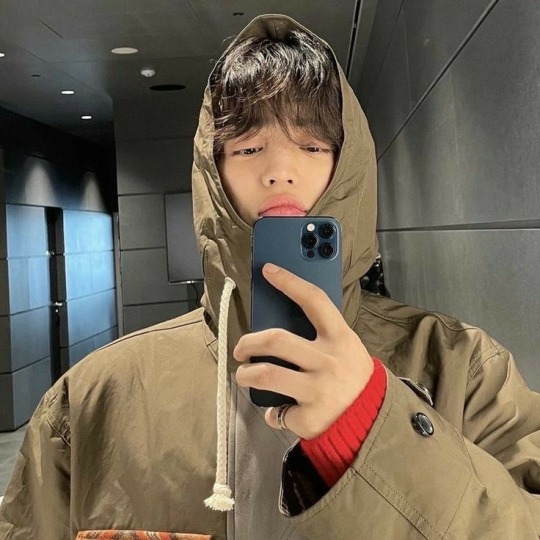
. . . most to least likely

1 . . . seungcheol
i don’t think anyone is surprised that choi seungcheol is the number one. you wouldn’t have to think AT ALL ever again with him, like come on - he’s big, buffy and dependable (jeonghan’s words, not mine). knowing him, he’d get offended if you tried to “think” - looking out for you, and taking care of you is his number one priority in life. i mean it, it’s his life mission.
2 . . . mingyu
husband material number two, he’s equally fixated on looking out for you as cheol. there is nothing that could distract mingyu from you, your well-being, and safety. the type to walk on the outer side of the sidewalk, and always holding your hand when crossing the road. not a single one of your brain cells would have to be active when he’d be around.
3 . . . joshua
the third husband coded man of svt. no matter how distracted you’d get, joshua would be there right by your side to make sure you wouldn’t hurt yourself or get lost if you were out on the town. there would be no need for you to be aware of anything, thanks to your lovely boyfriend. and it’d all come so naturally for him - he wouldn’t even have to think about it.
4 . . . minghao
hao, our silent and attentive boy that looks out for you, no matter what, would always make sure you’re taken care of, to the point where you wouldn’t really have to think around him. you could do whatever, and minghao would have no problem with protecting you from anything that could hurt you. he’s just so aware of you, and your presence.
5 . . . jeonghan
similar to mingaho in the sense that you don’t even realise that you’re not really “thinking” when you’re with him. even before you started dating he was always such a caretaker that it doesn’t really surprise anyone when you mindlessly follow jeonghan everywhere without a single care in the world.
6 . . . wonwoo
wonwoo is everything you could ask for - he is handsome, smart, funny, and most importantly he always makes sure you’re happy, well fed, and safe. he is ready to change a light bulb, make you dinner (even though he can’t cook for shit), pick you up after a party, and pack you lunch before school/work. the best part out of all of this is that you never have to ask for any of this - he just knows when you need him, so why do you need to think when your boyfie is always there for you
7 . . . woozi
woozi is kind of the middle ground between those who are excellent at taking care of you, and those who try their best, but are too easily distracted, or just prefer to be the ones taken care of. jihoon is always there for you, no matter what (obviously), but sometimes he can get a bit distracted, so you’d still have to be aware of your surroundings when out and about, or you’d have to check his luggage before a trip to make sure he packed his toothbrush.
8 . . . chan
a very observant lil bub that always keeps an eye on you. no matter how much you try to convince him you are good on your own, he still takes care of you in every way he can, and with time (you didn’t even realise when) you started to shut your brain off more and more when with your boyfriend. and come on, it makes him so happy when you depend on him, he loves when you grab his hand the second you exit the car, ready to trust your boyfriend with everything and anything.
9 . . . dk
does a pretty good job as being the “thinker” until something doesn't distract him, and because he is easily distracted, well… he is a cutie pie, though, and very obedient, so he will gladly follow you everywhere without much nagging so looking after him isn’t as hard as looking out for hoshi or vernon. there is one situation when you can definitely shut your brain off, and it’s in crowded places, because there is no way dk will let anything happen to you in a crowd.
10 . . . seungkwan
poor baby really tries to take care of you so can confidently shut your brain off with him, but at the end of the day your relationship is very 50/50… okay, more like 30/70 because usually it’s you who has to think about everything. seungkwan still tries to help you out as much as he can, he doesn’t want to be a burden to you, but sometimes he’s just so easily distracted or oblivious to what is happening around him.
11 . . . jun
easily distracted, manipulated, puts himself in dangerous situations on a daily basis, and has the tendency to wander off like a kindergarten kid, so naturally he’s the one to shut his brain off with you. looking after him can be quite tricky sometimes, he has his rebel moments when he want to make your life a living hell by worrying the shit out of you, but the second he sees you getting really stressed he gets back to his polite, and cute self.
12 . . . hoshi
this poor boy would get distracted so easily, you’d have to think for him. if you were out, hoshi would be the one to wander off, or not see the incoming car and almost getting hit by it - you’d have to be the one to save him from everything. it doesn’t mean he doesn’t care about you, but he’s a kid at heart that needs to be the protected one.
13 . . . vernon
same as hoshi, you need to be alert 24/7 with vernon. distracted easily, and does not understand the concept of dangerous situations - you’d definitely have to be the “thinker” in your relationship. like, if you were going on a trip you’d be the person that plans everything, is in charge of the maps, food, packing clothes, and vernon would be the one to venmo you money.

taglist (if you want to be added, check my masterlist): @jeonghansshitester @soul-is-a-strange-kid @weird-bookworm @sea-moon-star @hanniehaee @wonwooz1 @byprettymar @edgaralienpoe @staranghae @itza-meee @eightlightstar @immabecreepin @whatsgyud @hyneyedfiz @honestlydopetree @vicehectic @dkswife @uniq-tastic @marisblogg @aaniag @daegutowns @carlesscat-thinklogic23 @embrace-themagic @ohmyhuenings @nidda13 @hrts4hanniehae @k-drama-adict @isabellah29 @f4iryjjosh @bangantokchy @mrswonwooo @bangtancultsposts @lllucere @athanasiasakura @chillseo @onlyyjeonghan @haecien @caramyisabitchforsvtandbts @hannahhbahng @valgracia @ohmygodwhyareallusernamestaken @mirxzii @hhusbuds @wonranghaeee @rosiesauriostuff @gyuguys @aaasia111 @tomodachiii @veryfabday @lilmochiandsuga @asasilentreader @mrsnervous @bewoyewo @sharonxdevi @wondipity @gyuguys
#seventeen#seventeen imagines#seventeen x you#seventeen x reader#seventeen reactions#svt reactions#seventeen kpop#seventeen fluff#svt fluff#seventeen carat#seventeen reaction#seventeen requests#seungcheol#jeonghan#joshua#woozi#wen junhui#wonwoo#vernon#svt#seungkwan#dino#svt woozi#mingyu#minghao#hoshi#chwe vernon
1K notes
·
View notes
Text
apologize || lucy bronze x reader ||

lucy shows up at your door asking for you to take her back.
you should have known what to expect when barcelona played real mardrid. lucy had flip flopped emotionally after your breakup. she knew that you were angry with her for a lot of different things, but she hadn't expected you to genuinely be done enough to leave. in lucy's mind, you didn't mean it because you hadn't before. and now, she was stuck in an apartment that felt too big because you and buffy were gone.
"can i come in?" lucy asked you. it was a dumb quesion, but you had a stupid answer to give her back. "i've got a toy for b."
"she doesn't like barcelona," you said as you looked at the little barcelona dog toy that lucy had in her hand. she glanced past you to see the golden retriever with the old barcelona collar lucy had bought. lucy quirked an eyebrow as she pointed at the dog, who was waiting patiently behind you for lucy to come to her. somehow, buffy had been dealing with the breakup the worst, always whining and looking for the spots where lucy would have been back home.
"then she can tear it to shreds, just please let me in," lucy pleaded with you. you sighed and stepped aside. lucy smiled and pressed a kiss against your cheek as she moved into your apartment. "thank you lovey."
"don't call me that," you snapped at her. lucy frowned as she knelt down in front of buffy. your dog sniffed at the toy, but ignored it in favor of cuddling up with lucy.
"you got big, baby b. you're not a baby anymore, are you?" there was a hint of guilt in lucy's voice. she had been there when you got buffy as a puppy, and for the first year or so of the dog's life as well. now, she had missed the last seven months. "how has she adjusted to the move?"
"it could be better, but we're doing okay," you told lucy. she smiled as she stood up and turned to face you. "why are you really here?"
"to ask for forgiveness and a second chance. i miss you so much. i won't ask you to come back to barcelona, but i want you in my life. i'll come here, i'll do anything, but please, let me back in."
"lucy, you're the one who told me to go in the first place. you said that you were sick of me, remember?" you stared at her as you waited for her to answer you. lucy remembered it all, and she didn't know why she had snapped at you that night. things had been tough with the team, and after it sounded like alexia wouldn't be coming back as soon as they hoped, lucy lost it. if you had been any less secure in yourself, you would have accused her of cheating on you.
"please, just come back to me. i miss you," lucy admitted. you could tell that it was hard for her to say that, but she still hadn't actually apologized to you yet. "i'll make it up to you, i swear."
"apologize to me lucy. we were together for a year, and no matter what you did, i never made you say sorry. things are different now, and if you want me to let you back in, you have to apologize," you told her. lucy's face fell, as if what you had asked of her was impossible. you scoffed and started to walk away from her when she finally spoke up.
"i am sorry. i am sorry for neglecting our relationship. i am sorry for not being as nice to you as i should have been. i am sorry for snapping at you when you just wanted to talk to me. i am sorry for letting you walk out and not talking to you, but it took everything in me not to crawl back to you before either of us were ready. lovey, i can't express how sorry i am that i ruined our relationship," lucy apologized. you stopped and turned around to see her staring at the ground. the sniffle was quiet, but you didn't miss it anyway.
"oh bonita." you were over in lucy's arms before you had time to blink. you could feel her tears dripping onto your shirt as she buried her face against you. "i didn't think you'd do it."
"i meant it when i said i'd do anything to get back with you," lucy said. "can i stay here tonight?"
"that's moving things a little fast, but we never did go at everybody else's speed, did we?" you laughed. "you can stay, but don't try anything lucy. i'm trusting you to do things right this time."
"i will, and if i don't, you will never have to even look at me again," lucy swore. she wasn't one for over the top statements like that, so you knew that she meant it. she'd be good to you this time because she really hadn't loved anybody like you in a long time.
420 notes
·
View notes
Text
So insane Buffy has the “clawing herself out of her coffin essentially experienced her nightmare of being buried alive” trauma yet spends a significant amount of time both in graveyards AND UNDERGROUND in Spike’s crypt - relaxed enough both to have enough mind-blowing orgasms to tire out a slayer AND for her to fall asleep (as shown in “as you were”) both of which are RIDICULOUSLY difficult things for people dealing with depression to actually achieve
THE AMOUNT OF TRUST, COMFORT, AND SAFETY THAT SHOWS IN SPIKE IS ACTUALLY OFF THE CHARTS
It’s another reason the events of seeing red and “ask me again why I could never trust you” are so out of place and make absolutely ZERO sense because she DOES trust Spike and has shown that all throughout season 6 but she has actually trusted Spike since season 2 and the truce and the never revoking the invite
He is arguably the person she trusts most in the world by season 6 which we see immediately after the fact when she goes to drop off dawn at his crypt only to find him gone. She tells Xander he has the chip he can’t hurt Dawn because that is a fact that can’t be argued with but the reality is she has trusted the safety of her family to Spike since season 5
But yeah returning to the scene where you essentially clawed your way into your hell of a life for your supernatural fuck-a-thons is truly bonkers and says so much about how much she genuinely loves and trusts spike no matter how much she represses and denies it
206 notes
·
View notes
Text
BUFFY READING LIST
As promised @possession1981 and I have compiled a list of Buffy the Vampire Slayer (and Angel) related academic text and books. I think this is a good starting point for both a long time fan and for someone just getting into the show, or just someone interested in vampire lore. I have included several books about the vampire lore and myth in general as well. Most of these are available online.
BOOKS
Fighting the Forces: What's at Stake in Buffy the Vampire Slayer; edited by Rhonda V. Wilcox & David Lavery
Buffy the Vampire Slayer and Philosophy - Fear and Trembling in Sunnydale by James B. South
Buffy Goes Dark: Essays on the Final Two Seasons of Buffy the Vampire Slayer on Television, edited by Lynne Y. Edwards, Elizabeth L. Rambo & James B. South
Buffy the Vampire Slayer: Myth, Metaphor and Morality by Mark Field
Televised Morality: The Case of Buffy the Vampire Slayer by Gregory Stevenson
Undead TV: Essays on Buffy the Vampire Slayer by Elana Levine
The Aesthetics of Culture in Buffy the Vampire Slayer by Matthew Pateman
Girls Who Bite Back: Witches, Mutants, Slayers and Freaks by Emily Pohl-Weary
Why Buffy Matters: The Art of Buffy the Vampire Slayer by Ronda Wilcox
Into Every Generation a Slayer Is Born: How Buffy Staked Our Hearts by Evan Ross Katz
The Lure of the Vampire: Gender, Fiction, and Fandom from Bram Stoker to Buffy the Vampire Slayer by Milly Williamson
Blood Relations: Chosen Families in Buffy the Vampire Slayer and Angel by Jes Battis
Sex and the Slayer: A Gender Studies Primer for the Buffy Fan by Lorna Jowett
Diseases of the Head: Essays on the Horrors of Speculative Philosophy; edited by Matt Rosen (chapter 2 Death of Horror)
Public Privates: Feminist Geographies of Mediated Spaces by Marcia R. England (chapter 1 Welcome to the Hellmouth: Paradoxical Spaces in Buffy the Vampire Slayer)
Open Graves, Open Minds: Representations of Vampires and the Undead From the Enlightenment to the Present Day; edited by Sam George and Bill Hughes (chapter 8 ‘I feel strong. I feel different’: transformations, vampires and language in Buffy the Vampire Slayer)
The Contemporary Television Series; edited by Michael Hammond and Lucy Mazdon (chapter 9 Television, Horror and Everyday Life in Buffy the Vampire Slayer)
Joss Whedon and Race: Critical Essays; edited by Mary Ellen Iatropoulos and Lowery A. Woodall III
Buffy and the Heroine's Journey: Vampire Slayer as Feminine Chosen One by Valerie Estelle Frankel
The Existential Joss Whedon: Evil and Human Freedom in Buffy the Vampire Slayer, Angel, Firefly and Serenity by J. Michael Richardson and J. Douglas Rabb
Buffy the Vampire Slayer 20 Years of Slaying: The Watcher's Guide Authorized by Christopher Golden
Reading the Vampire Slayer: The Complete, Unofficial Guide to 'Buffy' and 'Angel' by Roz Kaveney
Hollywood Vampire: The Unnoficial Guide to Angel by Keith Topping
Buffy the Vampire Slayer: The Monster Book by Christopher Golden
Slayer Slang: A Buffy the Vampire Slayer Lexicon by Michael Adams
What Would Buffy Do? The Vampire Slayer as Spiritual Guide by Jana Riess
ARTICLES, PAPERS ETC.
Bibliographic Good vs. Evil in Buffy the Vampire Slayer by GraceAnne A. DeCandido
Undead Letters: Searches and Researches in Buffy the Vampire Slayer by William Wandless
Weaponised information: The role of information and metaphor in Buffy the Vampire Slayer by Jacob Ericson
Buffy, Dark Romance and Female Horror Fans by Lorna Jowett
My Vampire Boyfriend: Postfeminism, "Perfect" Masculinity, and the Contemporary Appeal of Paranormal Romance by Ananya Mukherjea
Buffy, The Vampire Slayer as Spectacular Allegory: A Diagnostic Critique by Douglas Kellner
"Buffy the Vampire Slayer": Technology, Mysticism, and the Constructed Body by Sara Raffel
When Horror Becomes Human: Living Conditions in "Buffy the Vampire Slayer" by Jeroen Gerrits
Post-Vampire: The Politics of Drinking Humans and Animals in "Buffy the Vampire Slayer, Twilight", and "True Blood" by Laura Wright
Cops, Teachers, and Vampire Slayers: Buffy as Street-Level Bureaucrat by Andrea E. Mayo
"Not Like Other Men"?: The Vampire Body in Joss Whedon's "Angel" by Lorna Jowett
Buffy the Vampire Slayer and the Domestic Church: Revisioning Family and the Common Good by Reid B. Locklin
“Buffy vs. Dracula”’s Use of Count Famous (Not drawing “crazy conclusions about the unholy prince”) by Tara Elliott
A Little Less Ritual and a Little More Fun: The Modern Vampire in Buffy the Vampire Slayer by Stacey Abbott
Undressing the Vampire: An Investigation of the Fashion of Sunnydale’s Vampires by Robbie Dale
"And Yet": The Limits of Buffy Feminism by Renee St. Louis & Miriam Riggs
Meet the Cullens: Family, Romance and Female Agency in Buffy the Vampire Slayer and Twilight by Kirsten Stevens
Bliss and Time: Death, Drugs, and Posthumanism in Buffy the Vampire Slayer by Rob Cover
That Girl: Bella, Buffy, and the Feminist Ethics of Choice in Twilight and Buffy the Vampire Slayer by Catherine Coker
A Slayer Comes to Town: An Essay on Buffy the Vampire Slayer by Scott Westerfeld
Undead Objects of a “Queer Gaze” : A Visual Approach to Buffy’s Vampires Using Lacan’s Extended RSI Model by Marcus Recht
When You Kiss Me, I Want to Die: Gothic Relationships and Identity on Buffy the Vampire Slayer by Ananya Mukherjeea
Necrophilia and SM: The Deviant Side of Buffy the Vampire Slayer by Terry L. Spaise
Queering the Bitch: Spike, Transgression and Erotic Empowerment by Dee Amy-Chinn
“I Want To Be A Macho Man”: Examining Rape Culture, Adolescent Female Sexuality, and the Destabilization of Gender Binaries in Buffy the Vampire Slayer by Angelica De Vido
Staking Her Claim: Buffy the Vampire Slayer as Transgressive Woman Warrior by Frances H. Early
Actualizing Abjection: Drusilla, the Whedonversees’ Queen of Queerness by Anthony Stepniak
“Life Isn’t A Story”: Xander, Andrew and Queer Disavowal in Buffy the Vampire Slayer by Steven Greenwood
S/He’s a Rebel: The James Dean Trope in Buffy the Vampire Slayer by Kathryn Hill
“Once More, with Feeling”: Emotional Self-Discipline in Buffy the Vampire Slayer by Gwynnee Kennedy and Jennifer Dworshack-Kinter
“The Hardest Thing in This World Is To Live In It”: Identity and Mental Health in Buffy the Vampire Slayer by Alex Fixler
"Love's Bitch But Man Enough to Admit It": Spikes Hybridized Gender by Arwen Spicer
Negotiations After Hegemony: Buffy and Gender by Franklin D. Worrell
Double Trouble: Gothic Shadows and Self-Discovery in Buffy the Vampire Slayer by Elizabeth Gilliland
'What If I'm Still There? What If I Never Left That Clinic?': Faërian Drama in Buffy's "Normal Again" by Janet Brennan Croft
Not Gay Enough So You’d Notice: Poaching Fuffy by Jennifer DeRoss
Throwing Like A Slayer: A Phenomenology of Gender Hybridity and Female Resilience in Buffy the Vampire Slayer by Debra Jackson
“You Can’t Charge Innocent People for Saving Their Lives!” Work in Buffy the Vampire Slayer by Matt Davies
Ambiguity and Sexuality in Buffy the Vampire Slayer: A Sartrean Analysis by Vivien Burr
Imagining the Family: Representations of Alternative Lifestyles in Buffy the Vampire Slayer by Vivien Burr and Christine Jarvis
Working-Class Hero? Fighting Neoliberal Precarity in Buffy’s Sixth Season by Michelle Maloney-Mangold
A Corpse by Any Other Name: Romancing the Language of the Body in Mary Shelley's Frankenstein for the Adam Storyline in Buffy the Vampire Slayer by Amber P. Hodge
Sensibility Gone Mad: Or, Drusilla, Buffy and the (D)evolution of the Heroine of Sensibility by Claire Knowles
"It's good to be me": Buffy's Resistance to Renaming by Janet Brennan Croft
Death as a Gift in J.R.R. Tolkien’s Work and Buffy the Vampire Slayer by Gaelle Abalea
“All Torment, Trouble, Wonder, and Amazement Inhabits Here": The Vicissitudes of Technology in Buffy the Vampire Slayer by James B. South
Staking Her Colonial Claim: Colonial Discourses, Assimilation, Soul-making, and Ass-kicking in Buffy the Vampire Slayer by Jessica Hautsch
“I Run To Death”: Renaissance Sensibilities in Buffy the Vampire Slayer by Christine Jarvis
Dressed To Kill: Fashion and Leadership in Buffy the Vampire Slayer by Christine Jarvis and Don Adams
Queer Eye Of That Vampire Guy: Spike and the Aesthetics of Camp by Cynthea Masson and Marni Stanley
“Sounds Like Kinky Business To Me”: Subtextual and Textual Representations of Erotic Power in Buffyverse by Lewis Call
“Did Anyone Ever Explain to You What ‘Secret Identity’ Means?”: Race and Displacement in Buffy and Dark Angel by Cynthia Fuchs
“It’s About Power”: Buffy, Foucault, and the Quest for Self by Julie Sloan Brannon
Why We Love the Monsters: How Anita Blake, Vampire Hunter, and Buffy the Vampire Slayer Wound Up Dating the Enemy by Hilary M. Leon
Why We Can’t Spike Spike?: Moral Themes in Buffy the Vampire Slayer by Richard Greene and Wayne Yuen
Buffy, the Scooby Gang, and Monstrous Authority: BtVS and the Subversion of Authority by Daniel A. Clark & P. Andrew Miller
Are Vampires Evil?: Categorizations of Vampires, and Angelus and Spike as the Immoral and the Amoral by Gert Magnusson
BOOKS ABOUT VAMPIRE LORE AND MYTH IN GENERAL
The Vampire Lectures by Laurence A. Rickels
Our Vampires, Ourselves by Nina Auerbach
Vampires, Burial, and Death: Folklore and Reality by Paul Barber
The Secret History of Vampires: Their Multiple Forms and Hidden Purposes by Claude Lecouteux
The Vampire Cinema by David Pirie
The Living and the Undead: Slaying Vampires, Exterminating Zombies by Gregory A. Waller
Vampire Forensics: Uncovering the Origins of an Enduring Legend by Mark Jenkins
Slayers and Their Vampires: A Cultural History of Killing the Dead by Bruce A. McClelland
The History and Folklore of Vampires: The Stories and Legends Behind the Mythical Beings by Charles River Editors
Encyclopedia of Vampire Mythology by Theresa Bane
Vampires of Lore: Traits and Modern Misconceptions by A. P. Sylvia
The Vampire: A New History by Nick Groom
Vampyres: Genesis and Resurrection: from Count Dracula to Vampirella by Christopher Frayling
Race in the Vampire Narrative by U. Melissa Anyiwo
Vampires, Race, and Transnational Hollywoods by Dale Hudson
229 notes
·
View notes
Text
Every now and then I just remember how Riley was painted as the victim in his relationship with Buffy and it just makes me so mad. The writers keep telling us that she didn't appreciate him and his way of loving her, but we are SHOWN that it was actually the other way around.
Buffy was not perfect, and it's clear she first got attached to Riley because he was a normal dude and she very much needed something in her life to be normal - but when it turned out he also had a secret life, that he was also the "hero" of his group, she accept it. She continued to like him. She still wanted him around.
Riley meanwhile seemed to resent her for being the slayer, for being stronger than him, for having other stuff going on in her life, for having dated/being the object of affection of guys that were stronger than him.
His insecurity is ridiculous. He was literally willing to die just to be a very strong, but also very dead guy, instead of being a completely healthy dude with the strength of a regular dude. He even acts like him not being able to beat Buffy in a fight, even with the "power up" is what is causing her to be "distant" sometimes, not the fact that, like he said himself, she needs to prevent the end of the world every other week and that's kinda stressful and takes a lot of her free time.
He also complains about her asking him to take care of her younger sister, the most important thing in the world to her, so she doesn't have to worry about that while out killing vampires and demons - and he thinks of that as her "not letting her be useful", and then complains again when she gives him a bullshit role in the whole "stopping the doom of all of humanity", even though he just refused the thing that would make him actually useful. He also conveniently forgets things like Buffy asking HIM specifically to take care of her after she was wounded in a fight. He doesn't see any of that as her truly including him in her life and full on needing him like he wants her to - because it's not in the way that allows him to pretend he is THE hero, not the hero's boyfriend. Being important TO her doesn't actually matter, what he really wants is to feel superior, to be more important than her.
And even outside of the Slayer stuff: this dude really heard that his girlfriend's mother was potentially dying, and instead of thinking of how he can be there for her (something he CLAIMS he wants to do) all he can think about is "Why didn't she immediately call me? Why did she tell Spike first?" (I'm a spuffy fan, but come on, she only told Spike because he just happened to show up at the very second she was ready to open up about it and just needed a shoulder to cry on). Everything, even his girlfriend's struggle with the possibility of her parent dying and her needing to step up as a parent to her sibling, needs to be about HIM, his feelings, his wants and needs.
The fucker even has the nerve to cheat on her during all of this. Compare that to Angel going to Sunnydale to give her emotional support after Joyce died, or Spike comforting her before even knowing WHY she was crying and then sending flowers without a card to honor her mom and offer Buffy some compassion, but without disrespecting her very explicit "stay away from me, Spike." It's very clear which of these three guys never actually cared about her, even a little bit.
Hell, Riley is 100% sure that the only way for Buffy to "prove" her love is to suffer for him. Her sister tells him "I like you much more than her ex, you would never break her heart like he did" - and somehow, he doesn't take that as "Buffy and her family fully trust that I'm a good guy that would never do anything to hurt her" (something Buffy herself says to Angel's face in his show) but rather as a "Nothing I do would ever hurt her because she doesn't actually love me the way she loved Angel."
Not to mention: his assumption that Buffy was only ever attracted to Angel because he was a vampire, and thus any other vampire like Draculla or Spike could easily steal her from him, just shows how much he didn't understand her at all.
Buffy started crushing on Angel thinking he was just a normal human that knew about the supernatural and wanted to fight the good fight. She didn't find out about him being a vampire until he lost control for a second and went vamp-face after their first kiss, and it freaked her out.
She fangirled for a second meeting Dracula, but man, come on, OF COURSE the slayer will be excited to see the most popular vampire ever, and she was more than willing to kill him. The whole reason there were any flirty vibes between them was because the dude had literal mind-control powers.
Spike is the closest Buffy ever got to "dating a vampire because he is a vampire" and that was because she was literally craving death. Even then, she was horrified at her own attraction to him, AND there was a different side to their relationship, with Buffy liking Spike because he was the one person that wasn't disappointed and resenting her for being depressed.
For fuck's sake, she had a thing for PLENTY of normal guys - RILEY VERY MUCH INCLUDED!
He was the one that only cared about "who is stronger" and kept insisting that Buffy was the same even after overwhelming evidence to the contrary.
And for the show to then make HER go after him, make HER all sad when he is dating someone else, make one of her closest friends blame HER for everything that went wrong in their relationship, and then make HER basically claim he was right with bullshit lines like "I wasn't there for him like I was for Angel" is ridiculous - specially when, again, what made Buffy want to be with Riley in the first place was her trying to not fall into another unhealthy relationship like the one she had with Angel. They were codependent and when he left it nearly destroyed her. OF COURSE she's gonna try not being as obsessed with the next boyfriend (or with the one after him) because she knows that shit doesn't end well.
Again, say what will about both Angel and Spike, but at least Angel walked away after realizing their relationship was a dead-end that would never make Buffy truly happy, and Spike put himself through hellish torture to get his soul back and make sure he'd be a better man who would never make Buffy suffer.
RILEY being framed as "the perfect guy Buffy couldn't appreciate and let get away" is just insulting. Of all the guys Buffy has ever been with, he is the one that deserved her the least.
501 notes
·
View notes
Text
While some of both Davis and Crawford’s work could arguably be described as camp (for the former, King Vidor’s Beyond the Forest; for the latter, later-era films such as Strait-Jacket and aspects of the wondrous Nicholas Ray film Johnny Guitar), that their entire careers and places within film history are defined as such does a disservice to their artistry. But they aren’t alone in representing what has become a troubling trend when it comes to women’s work. As camp entered the mainstream lexicon, especially after Susan Sontag’s landmark 1964 essay, “Notes on ‘Camp,’” the term has been increasingly tied to work featuring women who disregard societal norms. Camp is often improperly and broadly applied to pop culture that features highly emotional, bold, complex, cold, and so-called “unlikable” female characters. I’ve seen films and TV shows such as the witty masterwork All About Eve; the beguiling Mulholland Drive; the stylized yet heartwarming Jane the Virgin; Todd Haynes’s Patricia Highsmith adaptation Carol; the blistering biopic Jackie; the deliciously malevolent horror film Black Swan; Joss Whedon’s exploration of girlhood and horror, Buffy the Vampire Slayer; the landmark documentary Grey Gardens (which inspired the 2009 HBO film starring Jessica Lange and Drew Barrymore); and even icons such as Beyoncé and Rihanna be described as camp. Look at any list of the best camp films and you’ll see an overwhelming number of works that feature women and don’t actually fit the label. Usually, What Ever Happened to Baby Jane?, the film whose behind-the-scenes story provides Murphy’s launching pad for Feud, will be at the top of the list.
While camp need not be a pejorative, that hasn’t stopped it from being widely used as such. In effect, being labeled as camp can turn the boldest works about the interior lives of complex women into a curiosity, a joke, a punch line. The ease with which camp is applied to female-led films and shows of this ilk demonstrates that for all the (still-paltry) gains Hollywood has made for women in the decades since Davis and Crawford worked, our culture is still uncomfortable respecting women’s stories.
That major Hollywood icons such as Marlene Dietrich, Bette Davis, Joan Crawford (and, more recently, Natalie Portman, thanks to Jackie) have been roped into this lineage isn’t surprising. Society doesn’t know what to do with women of this ilk without discrediting their very womanhood. Take artist and filmmaker Bruce LaBruce’s offensive description of Mae West in an essay on camp: “[She] played with androgyny to the degree that her final performance — her autopsy — was necessary to prove her biological femaleness.” In his 2013 essay “Why Is Camp So Obsessed with Women?”, J. Bryan Lowder expands on Sontag’s most well-known line: “It’s not a lamp, but a ‘lamp’; not a woman, but a ‘woman.’ To perceive Camp in objects and persons is to understand Being-as-Playing-a-Role.” Lowder writes, “‘Woman,’ the concept within the quotation marks, is not the same thing, at all, as a real woman; the former is a mythology, a style, a set of conventions, taboos, and references, while the latter is a shifting, changeable, and ultimately indefinable living being. Of course, there may be some overlap.” But if all gender is a performance, where does the “real” woman begin? And why does the presence of camp hold more importance than the actual work and voices of actresses such as Crawford, who have come to be defined by it?
At times, camp can feel like a suffocating label. Its proponents often misconstrue the fact that recreating oneself as a character is not merely an aesthetic for women, but rather, for many, a matter of survival. Living in a culture that profoundly scorns ambition, autonomy, and independence in women, girls learn quickly the narrow parameters of femininity available to them. When they transcend these parameters, life can get even more difficult. Women often pick up and drop various forms of presentation in order to move through the world more easily. Performance as a woman — in terms of how one speaks, walks, talks, acts — can be a means of controlling one’s own narrative. Camp often limits this part of the discussion, focusing instead on the sheer thrill of watching larger-than-life female characters cut and snark their way across the screen. How these works speak to women, past and present, becomes a tertiary concern at best, and the work loses a bit of its importance in the process; it either comes to be regarded as niche or, if it still has mainstream prominence, as abject spectacle. In turn, the conversations around these works become less about the women at their centers and more about how those women are presented.
Much of Baby Jane’s camp legacy comes down to how more recent audiences have interpreted Davis’s performance. She’s ferocious, frightening, and grotesque. But framing Davis’s performance as camp, as Murphy does, doesn’t take into account how dramatically acting has shifted over the course of film history. In some ways, camp has become a label used when modern audiences don’t quite understand older styles of acting. Modern actors privilege the remote, the cold, the detached. The more scenery-chewing performances that make the labor of acting visible — such as the transformative work that Jake Gyllenhaal did in Nightcrawler, or most of Christian Bale’s career — is typically the domain of men. (Or, at least, it’s only men who can get away with it without being called campy.) As Shonni Enelow writes in a marvelous piece for Film Comment, “[Jennifer] Lawrence’s characters in Winter’s Bone and The Hunger Games don’t arrive at emotional release or revelation; rather than fight to express themselves, her characters fight not to. We can see the same kind of emotional retrenchment and wariness in a number of performances by the most popular young actors of the last several years.” Davis’s work as an actor was the antithesis of that; she painted in bold colors. Even her quietest moments brim with an intensity that cannot be denied.
#I love being the guy who posts the article and gets to completely tear it up paragraph by paragraph until I have all my favorite parts#together 💗 but I’ve never seen Jackie and she does several paragraphs on Jackie that make me want to watch#reading#angelica jade bastién
391 notes
·
View notes